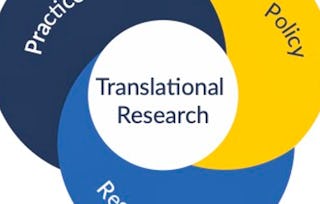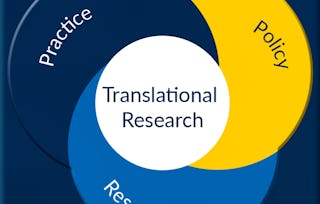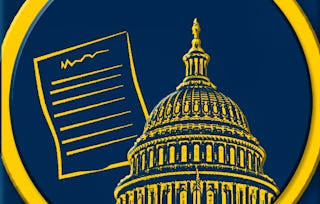Health research must positively impact the lives of the general population, so the public must receive and interpret research findings in a meaningful way. That is why translating research discoveries into practice is an important phase of the translational research spectrum.

Translating Research to Communities
3 days left! Gain next-level skills with Coursera Plus for $199 (regularly $399). Save now.

Translating Research to Communities
This course is part of Translational Science Specialization

Instructor: Vicki Ellingrod
Included with
What you'll learn
Understand concepts of population health research and the ethical use of data science to drive advances in human health.
Understand the importance of involving communities in research.
Explore models of community inclusion in conducting research and in sharing research findings, including contemporary public health examples.
Skills you'll gain
Details to know

Add to your LinkedIn profile
5 assignments
See how employees at top companies are mastering in-demand skills

Build your subject-matter expertise
- Learn new concepts from industry experts
- Gain a foundational understanding of a subject or tool
- Develop job-relevant skills with hands-on projects
- Earn a shareable career certificate

There are 3 modules in this course
Welcome to the course Translating Research to Communities. The process of moving evidence-based clinical discoveries into widespread health practice is a critical part of the translational research spectrum. In this module you will learn how to 1) define the concept of a learning health system, and 2) define community engaged research including how the terms 'community' and 'stakeholder' are defined.
What's included
1 video9 readings2 assignments
Welcome to Module 2 of the course Translating Research to Communities. In this module you will learn to 1) discuss the importance of the involvement of communities in research, 2) describe examples of research into practice (implementation science), and 3) identify common research techniques used in community engaged translational research.
What's included
3 videos6 readings2 assignments
Welcome to Module 3 of the course Translating Research to Communities. In this module you will 1) discuss the role of the federal government in supporting and regulating community engaged translational research, and 2) discuss the role of culture on research/ pragmatic clinical studies.
What's included
5 readings1 assignment1 discussion prompt
Earn a career certificate
Add this credential to your LinkedIn profile, resume, or CV. Share it on social media and in your performance review.
Instructor

Offered by
Explore more from Basic Science
 Status: Free Trial
Status: Free TrialUniversity of Michigan
 Status: Free Trial
Status: Free TrialUniversity of Michigan
 Status: Free Trial
Status: Free TrialUniversity of Michigan
 Status: Preview
Status: PreviewUniversity of Rochester
Why people choose Coursera for their career

Felipe M.

Jennifer J.

Larry W.

Chaitanya A.

Open new doors with Coursera Plus
Unlimited access to 10,000+ world-class courses, hands-on projects, and job-ready certificate programs - all included in your subscription
Advance your career with an online degree
Earn a degree from world-class universities - 100% online
Join over 3,400 global companies that choose Coursera for Business
Upskill your employees to excel in the digital economy
Frequently asked questions
To access the course materials, assignments and to earn a Certificate, you will need to purchase the Certificate experience when you enroll in a course. You can try a Free Trial instead, or apply for Financial Aid. The course may offer 'Full Course, No Certificate' instead. This option lets you see all course materials, submit required assessments, and get a final grade. This also means that you will not be able to purchase a Certificate experience.
When you enroll in the course, you get access to all of the courses in the Specialization, and you earn a certificate when you complete the work. Your electronic Certificate will be added to your Accomplishments page - from there, you can print your Certificate or add it to your LinkedIn profile.
Yes. In select learning programs, you can apply for financial aid or a scholarship if you can’t afford the enrollment fee. If fin aid or scholarship is available for your learning program selection, you’ll find a link to apply on the description page.
More questions
Financial aid available,

